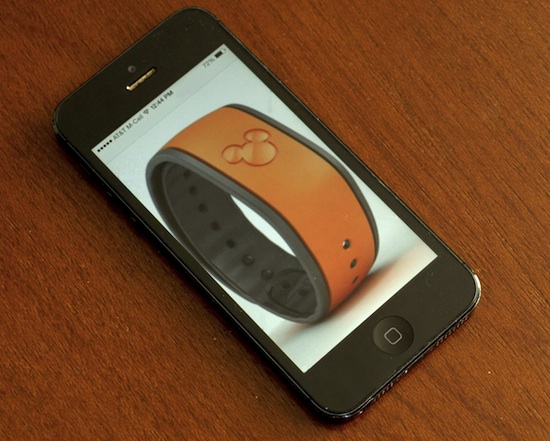Here's a good description of how the Apple Pay system will work, which uses new NFC [near field communication] tags installed in the devices to interface with tag readers at the retailers' check-out locations. The Apple Pay system charges your selected associated credit card for the purchase, but does not share that card information with store employees. All they see is a device account number and a transaction approval code. The iPhone will require a fingerprint scan on your phone screen to confirm the payment, so no one else can use your phone to make charges. And "Find my Phone" can disable the functionality on lost or stolen phones, too.
Disney's already built the infrastructure to support an NFC-driven tap-and-pay system at Walt Disney World, with its MagicBand system. Guests staying at Walt Disney World hotels can use their MagicBands to make purchases throughout the resort, which will be charged to their room account. Starting next month, other visitors will be able to use the tap-and-pay system, provided they have an iPhone 6 or Apple Watch. (WDW day guests and annual passholders with MagicBands cannot use the tap-and-pay system. At least not yet.)

Other providers have tried to launch tap-and-pay systems in the past, perhaps starting with Mobil's Speedpass, which worked with its credit cards at its gas stations. Broader alternatives, such as Google Wallet, haven't captured much market share, but Apple's bringing its huge Apple account customer base to the table here, so perhaps the iPhone might be the device that makes tap-and-pay popular in the United States.
The big question is, though... do you care? Does anyone really want to pay for stuff with a cellphone, or are people happy to continue using credit and debit cards and cash?
Increased security provides some appeal for the Apple Pay system, at least until more Americans' credit- and debit-card accounts switch to a European-style chip-and-pin system. And there's the potential convenience and security of simply leaving your cards at home. The convenience of having "one band to do it all" led Disney to create the MagicBand, which combines a theme park ticket, room key, charge card, PhotoPass and Fastpass return tickets in one device.
With Disneyland's new app enabling visitors to use their smartphones as theme park tickets, presumably a Disneyland visitor with that app on an iPhone 6 might get some of that MagicBand functionality on the west coast, where Disney has yet to roll out the bands. At this point, Disney's not supporting the use of smartphones to open hotel rooms, though other hotel operators are testing that functionality. Nor will a smartphone trigger on-ride photos when you ride, as a MagicBand can. But, then again, you can't take your own photos and video with a MagicBand, nor can you use it to call or text family and friends or browse the Internet while you wait in line.
The big problem with single devices that do everything is that they become a single point of failure to ruin your day. Lose your MagicBand and you're going to be losing time from your day trying to get it replaced. Lose your smartphone and you're facing an even worse hassle, particularly if it's unlocked and whoever finds it gains access to all your personal information stored or linked on the phone. (Not to mention the cost of replacement.)
Losing a wallet is a huge hassle, too, but you don't have to worry so much about dropping a wallet, or getting it wet. It'll be okay when you pick it up, or once it dries. A smartphone? Maybe not so much.
And then there's cash. Accepted at all restaurants, shops and food carts, there's no security issue with cash. No one can track what you spend. No one can steal your identity if he gets your cash. Sure, if you lose it -- it's gone. But there's no huge credit card billing awaiting you at the end of your vacation when you pay in cash. It's an interest-free way to enjoy yourself. (Just don't get pulled over by the police when you're driving with cash on you, though, as they might just decide to keep it!)
So how would you prefer to pay on your next theme park vacation? Would you like to use a MagicBand-style system? Or your own smartphone? Or would you prefer to stick the more traditional methods of payment -- cards or cash?
Let's break down your personal pros and cons for each system, in the comments.
Previously:
Tweet
Personally, my husband and I almost always leave our phones in our hotel rooms when going to theme parks. We don't want to have to worry about losing or damaging them on roller coasters or water rides. (And we don't feel the need to be constantly connected to things via apps, texts, etc. etc.)
I'd much rather keep to the old reliable method and not have my theme park experience be dictated by technology.
The magic band is brilliant for that, but failing that I really can't get worked up about having to use a credit or debit card. It's not like they are a burden to carry round....
This article has been archived and is no longer accepting comments.
Apple Pay is another alternative to MagicBands. It will probably work best at Disneyland since it doesn't have MagicBands.